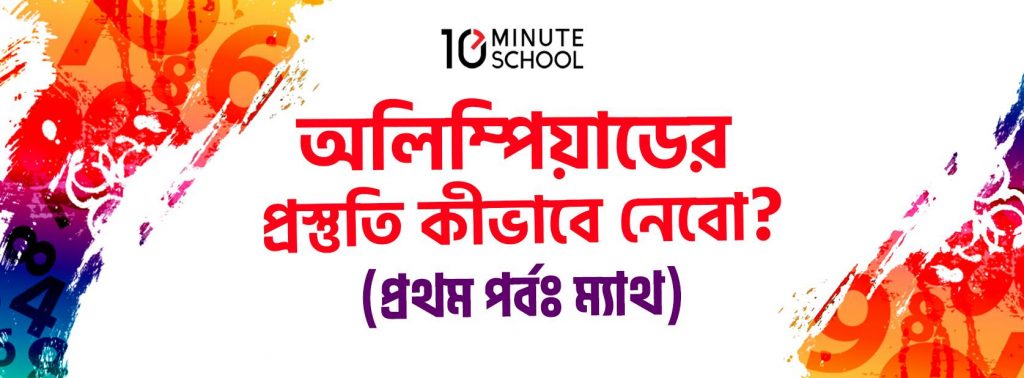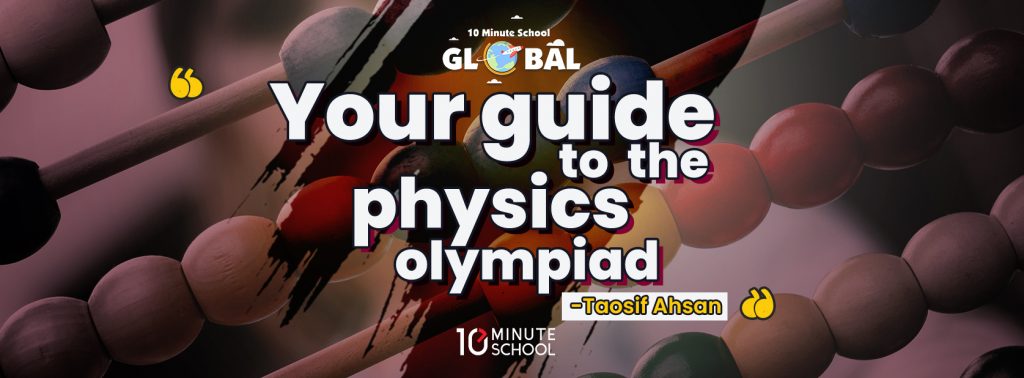Don’t have time to read? Then give it a listen.
We write this because of the overwhelming number of requests we get from passionate learners of Physics on how to start their journey in the Physics Olympiad. In the beginning, we must tell you one thing; the journey is a beautiful one.
“You are making a mistake.” “You’ll regret it later” “Will majoring in physics give you any money?”’Will you even have a job?” These might be the words that you will need to hear if you want to pursue a career in Physics. A very dangerous gamble indeed.
In fact, we are playing that gamble right now.
We don’t regret it. Because once you start this journey, the only thing that will matter to you is the problem in front of you: the twists and turns of those mazes and the incredible feeling after cracking the problem after countless failures. Very cliché, we know. But we mean it.
Anyway, Welcome to the realm of problem-solving. Welcome to the Physics Olympiad.
You might get overwhelmed by our guide. You might feel it’s too much to take in. In a short time, yes. But with long durations of dedication and perseverance, no. The path is a simple one, not an easy one. It takes time. It takes effort. If you are wondering whether it’s worth it or not, yes, it is.
We will provide a breakdown of how to get started. We will also be providing links to relevant resources. Let’s begin!
Getting Oriented
The way I see it, Olympiad problems are closer to playing games than giving any exam. The secret to success is to realize that there is no secret.
The most crucial part of beating these games is to realize your initial level.
So firstly, try to figure out your level by solving different problems from past National Physics contests, International Physics Olympiad, and Physics Cups. Try to create problems on your own and solve them. Kurgzesagt, push yourself as much as you can.
After you have realized your initial level, most probably, you are going to get frustrated. (Well, I definitely did!) Don’t worry; now it’s your turn to attack. Now that you have realized your weakness and strength, it is easy to develop them.
You can read an extraordinary book on problem-solving named “Art and crafts of problem solving” in order to increase your problem-solving skills.
Just remember one thing, Olympiad is a fun game of puzzles. So enjoy it! There is no reason for you to stress over it!
*You can get Bangladesh Divisional level problems here: https://goo.gl/Ae7SBy
*You can get Bangladesh National level problems here: https://goo.gl/tyP2JC
Okay, I’m Oriented, Now what?
It depends on which category you belong to. Generally, in Bangladesh National Physics Olympiads (BdPhO), contestants are divided into three categories: A, B, and C in order to provide all of them a level playing ground. In International level contests (IPhO, APhO, EUPhO) such type of division is absent.
A category (class-6 to 8):
Common sense implies that young chaps from the A category shouldn’t be very familiar with physics yet. But from our experience, we know that it simply isn’t true. For them, I would advise having a solid understanding of concepts of physics taught in grades 9-10 and 11-12. In addition to that, you guys should follow the bits of advice given for the B and C category and unique skills.
কোর্সটিতে শিক্ষার্থীরা পাবে:
HSC 23 শেষ মুহূর্তের প্রস্তুতি কোর্স (বিজ্ঞান বিভাগ)
B category (class 9-10):
Generally, the talent hunt for IPhO (International Physics Olympiad) team starts from the B category. Your continuous performance in NPhO and (hopefully) the APhO (Asian Physics Olympiad) for two years will increase your probability of being in the IPhO team drastically!
So let’s get down to business. We can hope that you have read and understood all the concepts of physics from HSC or A-level books. These books are not quite sufficient to excel at this stage.
Instead, we suggest a beginner book with elegant and exciting problems. The book is known as Physics by Halliday, Resnick, Krane, or simply known as HRK (well, there are two volumes of HRK, so I should have written in plural before!)
 Read more: অলিম্পিয়াডের প্রস্তুতি কীভাবে নেবো? (প্রথম পর্ব: ম্যাথ)
Read more: অলিম্পিয়াডের প্রস্তুতি কীভাবে নেবো? (প্রথম পর্ব: ম্যাথ)
Every chapter contains some challenging problems to solidify the understanding of physics and develop skills. Some people suggest Fundamentals of Physics by HRK (again!) or University physics by Mark Zemanski and Francis Sears.
But the problem is you need a solid base in Calculus to understand these books. Physics can’t be fully appreciated unless you are comfortable with integrations and differentiation. In this case, HSC problems are more standard and trickier than other curriculums if you solve them on your own, but for the B category, this is not sufficient.
To have that type of skill, you can start to solve problems from Calculus by Howard and Anton. This book has an excellent continuity from basic materials to high-thought concepts. If this book doesn’t suit you, you can choose Calculus for Dummies by Mark Ryan.
But reading books is not going to help you if you don’t know how to solve problems. You have to solve many many many problems. Solve problems from National Physics Olympiads, from everyday phenomena you encounter, from everywhere. And you don’t need to follow our advice, you can create your path! That’s the beauty of Olympiads! Nobody can tell you what is best for you but you!
C category:
The real challenge is for you guys. There is no room for mistakes at this stage. Some good books to hone your problem-solving skills at this stage are Problems in general Physics by I.E. Irodov and Aptitude Test: Problem in physics by Krotov.
However, these books are focused on solving problems revolving around one particular sector, mechanics. And don’t get me wrong, these are fascinating books for physics, and you will need to solve problems from these books quite often. But the thing is, In Physics Olympiad, you have to be skilled in every sector.

The Problems will always require skills from different areas (i.e. mechanics and relativistic electrodynamics.) So having at least working capability in every sector is far more effective than being a specialist in the beginning. After attaining the required skill set in every sector, you can then start to become a specialist in particular areas.
কোর্সটিতে যা যা পাচ্ছেন:
HSC 2025 অনলাইন ব্যাচ (ফিজিক্স, কেমিস্ট্রি, ম্যাথ, বায়োলজি)
Be a specialist!
So far all we have talked about revolved around general skill-sets. Now we are going to dive deep into every area of physics. To excel in mechanics, you have to finish Introduction to Mechanics by Kleppner and Kolenkow first.
After that, you can solve problems from Introduction to Mechanics by David Morin or read Classical Mechanics by J.R. Taylor. To dive deep into the heart of thermodynamics, we would suggest reading Thermal concepts in physics by Bundle and Bundle (oxford coursework.) For optics, you can see Optics by Ajoy Ghatak.
To know fundamental concepts of Electricity and Magnetism out of sheer curiosity (i.e. how magnetism can be derived from basic equations of relativity and electricity, why refraction happens, and why it depends on the frequency of wave etc. etc.) you can read Introduction to Electricity and Magnetism by Griffiths or Electricity and Magnetism by Edward M Purcell.
If you are interested in learning true quantum mechanics (not the hilly-billy taught in high school texts), you can look up Principals of Quantum Mechanics by Ramamurti Shankar and Modern Quantum mechanics by J.J. Sakurai. (Warning given: you will need a decent mathematical background on state vectors, state operators, Eigen sets, Eigen Values, etc., etc.)
You can read Mathematical Methods for Physics and Engineering by K.F. Riley, M. P. Hobson, and S.J. Bence. (Again warning given: this is a relatively large book) to become skilled in mathematics needed in physics (i.e. nonlinear DE, PDE, Residue theorem, Furrier transform, Green’s theorem, etc.) Although in my opinion, this will not be necessary for physics competitions. But this is a must to pursue a career in physics.
Another two gems for physics enthusiasts are good old Feynman Lectures and Walter Lewin Lectures.
If someone is interested, he can find all three volumes of Feynman lecture here: – http://www.feynmanlectures.caltech.edu.
All three volumes of Feynman lectures are a gem, but the last one is unique for its quantum mechanics.
For Walter Lewins Lectures:-
Mechanics- https://goo.gl/TtWbZW
Electricity and Magnetism- https://goo.gl/4mQAWP
Vibration and Waves- https://goo.gl/JJqShu
Problems and more Problems:-
As we have stated before, it is physics is all about problem-solving. So, solve as many problems as you can.
Stage-1:
In addition to solving past physics Olympiad problems you can solve some interesting problems from 200 puzzling physics problems and Physics Olympiad-basics to Advanced exercises by the committee of Japan Physics Olympiad. These are pretty good books. And yes! 200 physics problems have a sequel, 200 more physics problems (talk about having original names!)
Stage-2:
And now you are at a stage to encounter really hard problems. To feel the almost heavenly happiness after solving some insanely hard problems, you can solve problems from Jaan Kalda’s website (link: – https://www.ioc.ee/~kalda/ipho/ .)
Try to solve some of its problems, and you’ll see what I am talking about. To solve problems with Great Russian taste, you can solve problems from Kvant paper.
You can find some peculiar problems gathered by Shovon Biswas (IPhO 2013) here: – https://goo.gl/HUHMNt
Stage-3:
Now you can start solving international-level problems. You can find all IPhO problems here:-http://ipho.org/problems-and-solutions.html
You can solve problems from EuPhO (European physics Olympiad), APhO (Asian Physics Olympiad), and GPhO (Gulf Physics Olympiad) PUPC (Princeton University Physics Competition.)
Stage -Master:
Finally, you can solve problems from Physics Cup (in my opinion these are the hardest problems in any physics contest in the world.) Link:- https://www.ioc.ee/~kalda/ipho/PhysicsCup2018
Final thoughts:
We think that there are many people in the world who are interested in physics for the sake of physics and nothing else. It has some very nice consequences. If someone is genuinely interested in physics, it creates a pure passion for physics which lasts for an entire life.
To meet some unique people most of whom were deemed unsocial weirdos by society and discover their inner world, to meet some people with the almost inhuman ability to think outside of the box, to feel the adrenaline rush during the crux of a problem, to feel the innocent pleasure after solving a problem, that’s all Olympiad is all about, nothing more.
So welcome home Mr/Ms. Weirdo. We are pleased to call you family!
Start Problem Solving. You won’t regret it.
Sincerely Yours,
Taosif Ahsan
Silver Medalist, IPhO 2017
Princeton University
S.m. Masruk Uddin
Co-founder of Paradox Physics School
Academic team member of BDPhO
This article’s audiobook is read by Rafsan Lazim.
Check Out:
- Communication Masterclass by Tahsan Khan
- Facebook Marketing Course by Ayman Sadik and Sadman Sadik
- ঘরে বসে Spoken English Course by Munzereen Shahid
- Microsoft Office 3 in 1 Bundle
- English Grammar Crash Course by Sakib Bin Rashid
- ঘরে বসে Freelancing by Joyeta Banerjee
Visit 10 Minute School’s website www.10minuteschool.com
If you want to unleash the writer in yourself and contribute to 10 Minute School, simply send your write-up to the following e-mail address: write@10minuteschool.com





আপনার কমেন্ট লিখুন